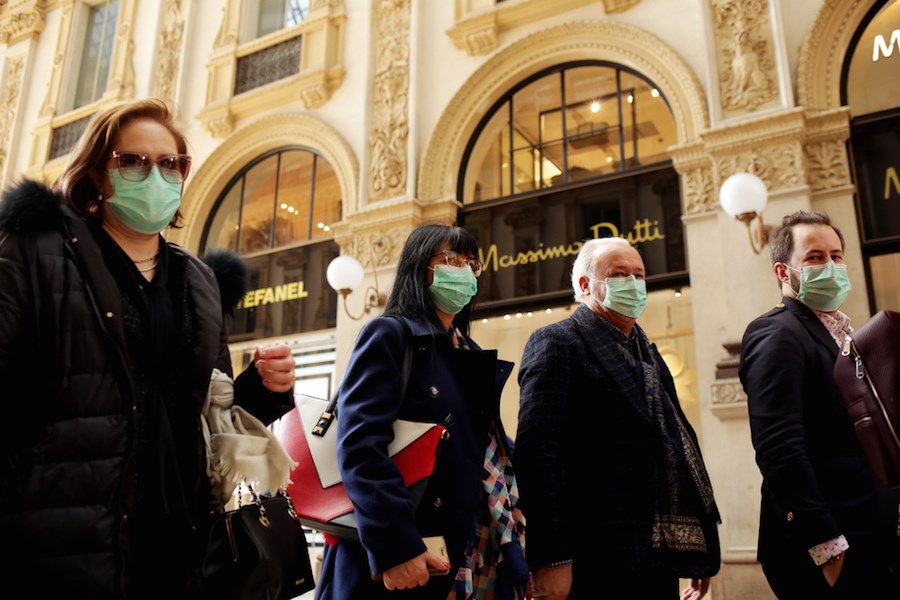Stuck in northern Italy, here’s what Daria Dosselli has to say to her fellow Victorians and Canadians: Take COVID-19 seriously now, before it’s too late.
As it is, we have a chance to learn from Italy’s experience. “It’s early,” she says. “That could be your saving grace.”
Dosselli is on the phone from Padua, an ancient city 40 kilometres west of Venice. Celebrating her mother’s 90th birthday there was one of the reasons Dosselli, 59, and her husband, Gianfranco Mosca, 67, went to Italy in early December.
Now, not only can they not find their way back to Victoria, but travel restrictions prevent them from even being together.
Instead, they’re stranded in the hardest-hit end of the country now at the heart of the pandemic. A Padua hospital was, in fact, where the disease took its first life in Europe just under a month ago. Now the whole country is part of an effort to put the brakes to the outbreak through isolation and prevention.
“The whole thing just seems surreal,” Dosselli says. “When you look out the window, there are very few, if any, people walking on the street.” All is silent, save for the ambulance sirens.
Dosselli and Mosca, Italian-raised permanent residents of Canada, have lived in Victoria for almost 12 years.
After taking early retirement from a career in banking, Mosca followed his passion and became a chef, doing private events in Victoria. Dosselli also started out in banking before turning to the hospitality industry. She’s a sommelier, among other things.
They travelled separately in Italy, visiting family members. On March 7, Mosca and a daughter who had been studying in Spain joined Dosselli in Padua for the birthday celebrations — only to turn around and leave as word came that the city was to be among those cut off to prevent the spread of the virus. The lockdown later was applied to the whole country.
The couple tried to heed Justin Trudeau’s advice to come back to Canada, but that proved easier said than done. They were to fly home last week, but lost the opportunity when the first leg of their journey, a flight to London, was cancelled. They found a flight from Paris next week, but it looks like it will be grounded, too. “It sounds to me like we’re not going to be able to come back,” Dosselli said.
Internal travel restrictions mean Mosca must remain in Turin with his brother, while Dosselli is in Padua. “He cannot come here. I cannot go there.” The daughter has returned to Spain, where the situation is also grim. Another daughter is in Victoria.
Italy’s restrictions are strict. In essence, people can only move around to go to work (if it hasn’t been shut down), for a medical emergency, to shop for food or to travel to their home.
You need papers that say where you’re going. Police are stopping both motorists and pedestrians to check. Those who break the rules face fines, even jail. There’s no visiting friends or family. “They’re trying to stop people from moving unnecessarily.”
Italians are on board. Nobody freaked out and bought masses of toilet paper. Some grocery shelves were emptied at the beginning of the lockdown, but were soon restocked. If there are long lines outside supermarkets, it’s because they only allow so many people in at a time, and those in the queue must maintain distance from one another.
“There is no shortage of any item,” Dosselli said. She avoids the larger stores, figuring there’s less chance of infection at the small ones.
That’s the response now, but Dosselli says Italian politicians found it hard to get tough before the crisis became apparent to the public. Instead of implementing measures to get ahead of the outbreak, authorities only did so in response to the worsening reality. “All of a sudden, it became too late.” A handful of cases became hundreds, which became thousands.
This is where she sees Canada’s window of opportunity. We have to realize the stuff we think is serious — the economy, our investments, hitting work deadlines, figuring out child care, whatever — is secondary. “The only thing that matters in the end is we’re healthy.”
Her advice? Stop believing everything on your social-media feed, stick to information from credible sources, imagine what it’s like to live Italy’s experience and think: “What can I do now so that we don’t get to that stage?”
Forget going to the gym. Put your walking group on hold. “These are small sacrifices.”
If need be, Dosselli is prepared to ride it out in Italy. “We’re not in a panic mode.” She does not fear getting the virus, but wants to do her part to halt its spread, bringing relief to northern Italy’s excellent but overwhelmed medical system.
But yes, she would prefer to be in Victoria.
“Sometimes it’s just comforting to be home.”
Read more from the



